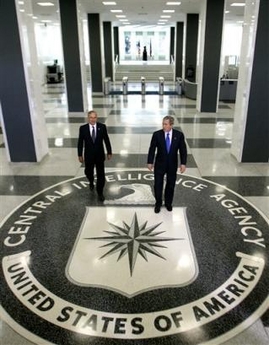In a highly unusual move, the CIA has fired an employee for leaking
classified information to the news media, including details about secret CIA
prisons in Eastern Europe that resulted in a Pulitzer Prize-winning story,
officials said Friday.

President Bush arrives
with CIA Director Porter Goss, left, to talk to reporters after he
received an intelligence briefing at Central Intelligence Agency
headquarters in Langley, Va., near Washington, in this Thursday, March 3,
2005, file photo. [AP] |
The Associated Press has learned the officer was a CIA veteran nearing
retirement, Mary McCarthy. Reached Friday evening at home, her husband would not
confirm her firing.
In McCarthy's final position at the CIA, she was assigned to its Office of
Inspector General, looking into allegations the CIA was involved in torture at
Iraqi prisons, according to a former colleague who spoke on condition of
anonymity because the case is under investigation.
Without identifying McCarthy by name, CIA Director Porter Goss announced the
firing in a short message to agency employees circulated Thursday. Such firings
are rare. And it is the first time since Goss took over in September 2004,
vowing to clamp down on leaks, that he has dismissed an intelligence officer for
speaking with reporters.
Agency spokesman Paul Gimigliano confirmed an officer had been fired for
having unauthorized contacts with the media and disclosing classified
information to reporters, including details about intelligence operations.
"The officer has acknowledged unauthorized discussions with the media and the
unauthorized sharing of classified information," Gimigliano said. "That is a
violation of the secrecy agreement that everyone signs as a condition of
employment with the CIA."
Citing the Privacy Act, the CIA would not disclose any details about the
officer's identity or what she might have told the news media. However, a law
enforcement official confirmed there was a criminal leaks investigation under
way, but it did not involve the fired CIA officer.
The official said the CIA officer had provided information that contributed
to a Washington Post story last year disclosing secret U.S. prisons in Eastern
Europe. The law enforcement official spoke only on condition of anonymity,
citing the sensitivity of the matter.
The Post's Dana Priest won a Pulitzer Prize this week for her reporting on a
covert prison system set up by the CIA after Sept. 11, 2001, that at various
times included sites in eight countries. The story caused an international
uproar, and government officials have said it did significant damage to
relationships between the U.S. and allied intelligence agencies.
Post Executive Editor Leonard Downie Jr. said on the newspaper's Web site,
"We don't know the details of why (the CIA employee) was fired, so I can't
comment on that. But as a general principle, obviously I am opposed to
criminalizing the dissemination of government information to the press."
It was unclear if Priest or any other reporters who spoke to McCarthy would
be brought into an investigation. Post spokesman Eric Grant said no reporter at
the paper had been subpoenaed or had spoken to investigators about the matter.
Goss has pressed for aggressive probes about leaked information.
"The damage has been very severe to our capabilities to carry out our
mission," Goss told Congress in February, adding that a federal grand jury
should be impaneled to determine "who is leaking this information."
On Friday, another government official, also speaking on condition of
anonymity because of the sensitivity of the information, said the fired officer
had failed a lie-detector test.
It was not clear if the person was taking a routine polygraph examination, as
is required periodically of employees with access to classified information, or
if the lie-detector test was among those ordered by Goss to find leakers inside
the agency.
Justice Department officials declined to comment publicly on the firing and
whether the matter had been referred to federal prosecutors for possible
criminal charges. One law enforcement official said there were dozens of leak
investigations under way. Another said there had been no referral from the CIA
involving the fired employee, normally a precursor to a criminal investigation.
Both spoke on condition of anonymity because the matter is under investigation.
Journalists are known to have been questioned or subpoenaed in the
investigation of who in the Bush administration leaked a CIA officer's identity,
and the Justice Department is probing who revealed the existence of the National
Security Agency's warrantless eavesdropping program. The New York Times won a
Pulitzer for its stories on the eavesdropping program.